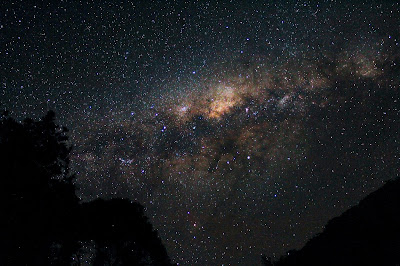I gathered that new sensors in most cameras-even entry level ones are perfectly capable of capturing the milky way. Any DSLR or compact camera with manual controls can be used to gather enough light over a long exposure to shoot the night sky. So I bought my first DSLR, a Canon 1300D and a basic tripod for about 500AUD. This is an entry level camera and is one of the cheapest DSLRs in the market. Some blog posts and YouTube videos later I set off in search of dark skies.
After a couple of attempts I am very happy with my results and have even got better results than some photos that I drew inspiration from. I'm still learning and hoping to improve on my methods and results. The usual process I follow to shoot the stars is, waiting for a day with clear skies, checking the moon phase, the position of the milky way and selecting a dark location without much light pollution. The pictures below are some of my best shots taken up to now, with a little description on the story behind the shot.
My first attempt at shooting the Milky Way. The stars are out of focus and not a very good image, but was a valuable learning experience. Location:Paradise beach Gippsland
These three shots were taken at Silvan Dam Olinda. The first using the 18mm kit lens and the other two using a 50mm prime lens at f2.0 borrowed from a friend.
My first shot of the galactic core taken at the Cape Schanck beach. It was a misty day with plenty of moonlight to illuminate the landscape. But the milky way was very faint.
Clearly visible galactic core taken at Olinda
Another shot of the galactic core taken at Wilsons Prom under moonlight.
This shot was also taken at Wilsons Prom after the moon set. This was the best naked eye view of the Milky Way I've experienced up to now.
This shot taken at Olinda is one of my favorites because of the unintentional effect of light painting. A car passed by during exposure and it illuminated the tree and a power line nearby, giving the photo a more balanced look.










No comments:
Post a Comment